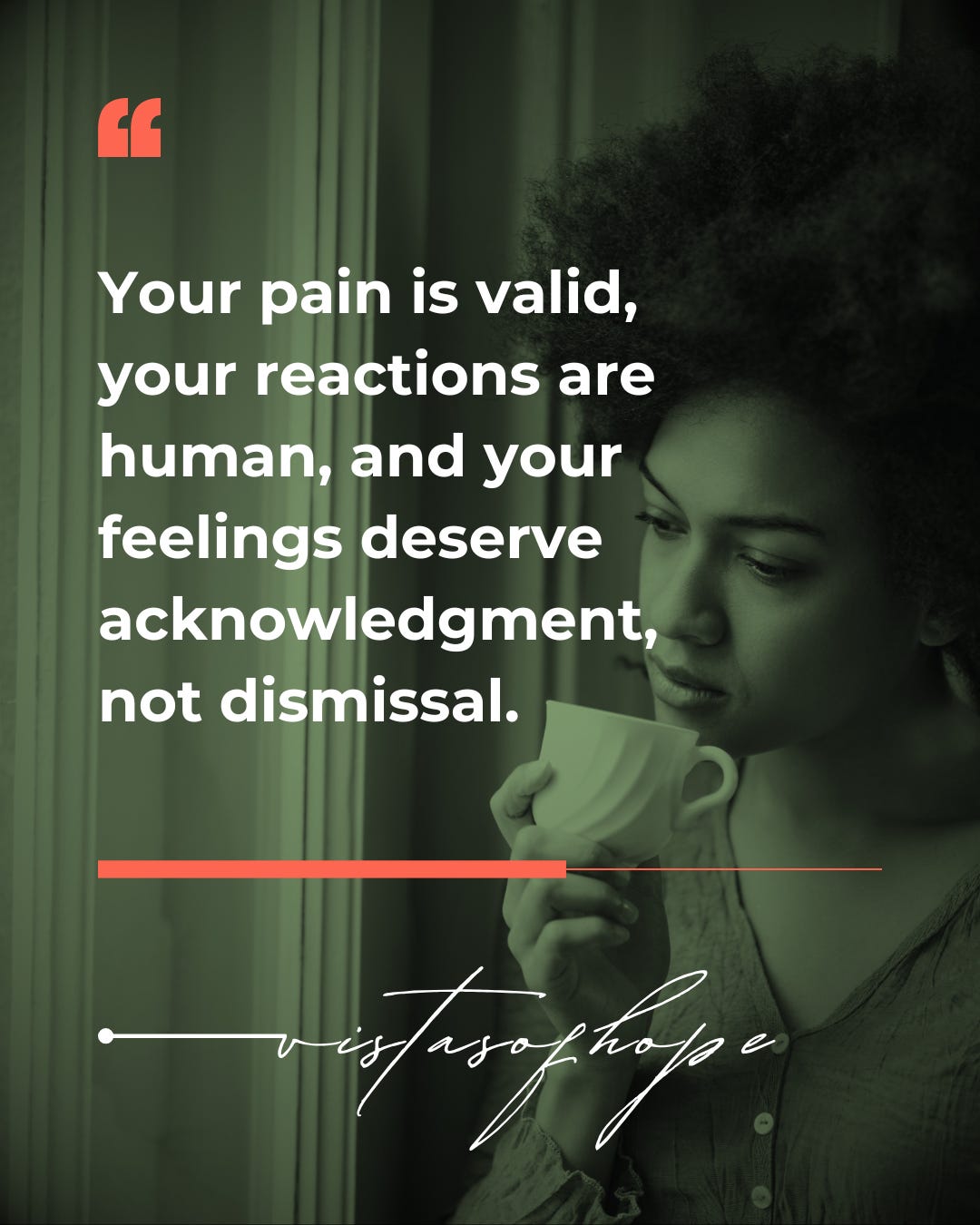Dear, Dear Someone, _
In the quiet moments when doubt creeps in, when you question the legitimacy of your own feelings, I want you to pause and listen closely. Listen to the whisper of your heart, the one that's been silenced too many times. That voice? It's telling you a truth that others have tried to drown out: Your pain is real. Your reactions are valid. You are not overreacting.
Have you ever felt like you're screaming into a void? Like your hurt is invisible to those around you, but your response to that hurt becomes the center of attention? It's a disorienting, maddening experience - one that can make you question your own reality. This, dear one, is what it feels like to be the scapegoat in a situation where you've been wronged.
Let's paint a picture together. Imagine a child, innocently playing, when suddenly another child pushes them down. The pushed child cries out in pain and frustration. Now, picture the adults rushing over, not to comfort the hurt child or reprimand the pusher, but to scold the crying child for making a scene. "Stop overreacting," they say. "It wasn't that bad. You're too sensitive."
Does this scenario feel painfully familiar? If so, you've experienced the cruel paradox of being both the victim and the villain in others' eyes. It's a position that can leave you feeling confused, angry, and deeply alone.
Here's what's really happening: When people focus on your reaction instead of the action that hurt you, they're engaging in a form of gaslighting. They're shifting the narrative, making you the problem instead of addressing the real issue at hand. It's a tactic often used by those who want to avoid taking responsibility for their actions or by bystanders who find it easier to silence the person expressing pain than to confront the one causing it.
This dynamic can play out in various relationships - with family, friends, romantic partners, or even in professional settings. The pattern is always the same: You express hurt over someone's actions, and suddenly, you're painted as "too emotional," "overreacting," or "making a big deal out of nothing." Your valid feelings become weaponized against you, used as proof of your supposed instability or unreasonableness.
Let me be clear: This is not okay. This is not normal. This is not something you should have to endure.
Your emotions are not inconvenient truths to be swept under the rug. They are valid responses to real experiences. When someone hurts you, you have every right to feel that hurt. When someone betrays your trust, your anger is justified. When someone dismisses your feelings, your frustration is understandable.
It's crucial to recognize this pattern for what it is - a form of emotional manipulation. By making your reaction the issue, those responsible for hurting you deflect attention from their own actions. It's a clever, albeit cruel, way of avoiding accountability.
But here's the thing: You are not responsible for managing other people's discomfort with your pain. You are not obligated to minimize your feelings to make others feel better about their actions. Your emotions are not a burden; they are a vital part of your human experience.
So, what can you do when you find yourself in this situation? How can you break free from the role of scapegoat and reclaim your emotional truth?
First and foremost, trust yourself. Trust your feelings. When something hurts you, acknowledge that hurt. Don't let anyone convince you that your pain isn't real or valid. Your emotions are your internal compass, guiding you through the complex landscape of human interactions. Honor them.
Next, practice self-validation. When others try to dismiss your feelings, be your own advocate. Remind yourself: "My feelings are valid. My reaction is a natural response to being hurt. I have the right to express my emotions."
It's also important to set boundaries. Make it clear to those around you that dismissing your feelings or shifting blame onto your reactions is not acceptable. You might say something like, "I understand my reaction seems strong to you, but I need you to focus on the action that caused it. My feelings are not the problem here."
Seek out supportive relationships. Surround yourself with people who validate your experiences, who listen without judgment, who acknowledge your pain instead of dismissing it. These relationships can be a lifeline when you're struggling to trust your own perceptions.
Consider keeping a journal. Writing down your experiences can help you maintain a clear perspective on what's really happening. It's a way to validate your own feelings and experiences, even when others are trying to distort them.
Remember, healing from this kind of emotional manipulation takes time. Be patient with yourself. There may be moments when you slip back into old patterns of self-doubt. That's okay. Healing isn't linear. Each time you stand up for your emotions, each time you refuse to be the scapegoat, you're growing stronger.
As you navigate this journey, hold onto this truth: Your worth is not determined by how conveniently your emotions fit into others' narratives. You are allowed to feel deeply. You are allowed to react to pain. You are allowed to demand that your feelings be acknowledged and respected.
In a world that often tries to silence those who express pain, your voice matters. Your feelings matter. Your experiences matter. Don't let anyone convince you otherwise.
You are not "too sensitive." You are not "overreacting." You are a human being with a rich emotional life, responding naturally to the world around you. Embrace that. Celebrate it, even. Your capacity to feel deeply is not a weakness - it's a strength. It's what allows you to connect deeply with others, to empathize, to love fiercely.
As you move forward, carry this knowledge with you: The next time someone tries to make your reaction the issue, pause. Take a deep breath. Remind yourself of your worth, your validity, your right to feel. Then, with calm certainty, redirect the focus to where it belongs - on the actions that caused your pain.
You are not the scapegoat in your own life story. You are the protagonist, the hero of your own journey. And heroes feel. Heroes hurt. Heroes react. But most importantly, heroes rise, again and again, stronger each time.
Stand tall in your emotional truth. Your feelings are not just valid - they're valuable. They're the colors that paint your world, the music that gives rhythm to your days. Never let anyone dull your palette or silence your song.
With unwavering support for your emotional journey,
—Ali Papa.
P.S.— Remember, those who try to invalidate your feelings are often the ones most uncomfortable with their own. Your emotional honesty is a gift - never apologize for it.
—Thank you for taking the time to read my letters.
If you love this letter, you’ll love my books. They are written for you, to warm your heart and soul. They are written for broken hearts of all shapes and sizes. They are full of good things—everything I have been wanting to say to you and they are available for FREE download to all tribe members.
If you were unable to find yourself in today's letter, you don't have to worry. Tell me what you feel here, and I will write you a personal letter. The same God who can help you get by in life can also help you excel in life.
—Who is Ali Papa?
I'm a husband, father, friend, and merchant of faith, hope, and love, crafting heartfelt letters for every season and story. Writing to you is more than a hobby for me. It's a passion, a calling, and a way of life. I pour my heart and soul into every letter I send you, hoping to inspire you, inform you, heal with compassion, illuminate paths, instill courage, uplift spirits, spread positivity, and connect with sincerity.
My wish is that you continue to find the words that express your deepest and strongest emotions from them, regardless of the circumstances, and that you keep experiencing life, love, freedom, and fulfilment in your relationship. I live in Port Harcourt with my supportive wife and three adorable kids, who teach me the value of love every day.


















